Episode 1: Powering A Better Future With Science of Dassault Systèmes Science in the Age of Experience virtual event launched a month-long examination and celebration of how science propels innovation to improve the world we live in.
Register now to watch Episode 1 for the first time, or log in through your personal link to watch it again.
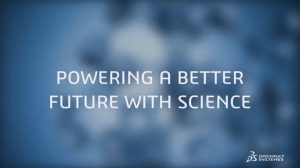
This was the first time Science in the Age of Experience was held virtually – a series of four episodes highlighting scientific innovations underway now in life sciences, sustainable manufacturing and sustainable cities. Science leaders are joining from around the globe online for presentations of their work, roundtable discussions and interactive Q&A. The goal is building a global scientific community across the industry spectrum.
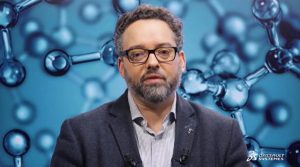
Patrick Johnson, Sciences & Corporate Research, Senior Vice-President, Dassault Systèmes, hosted the session. He noted the challenging year we have faced with the worldwide pandemic, natural disasters from fires and storms, and cultural challenges. Yet, we have seen incredible resilience, courage and response from around the world. Science and technology often took the lead to drive innovation, foster collaboration and push towards improving our everyday lives and building a more sustainable future.
Patrick introduced Bernard Charlès, Dassault Systèmes’ Vice Chairman and CEO, to start the event. Bernard described the journey the company has traveled.
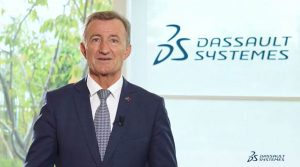
“We’ve invested a lot to manage complexity, connecting the dots, looking at simple phenomena, connecting them together and observing the total result in a holistic way,” said Bernard. “Now we’ve joined with MEDIDATA and using the platform in a disciplined approach to move from things to life, taking the knowledge and know-how of the virtual world done over 40 years in creating things and applying it to life.”
During the pandemic, startups and companies came together on the 3DEXPERIENCE platform and applied solutions systematically across the world – for example, new ventilators, using print-on-demand to generate PPE, the BIOVIA community using analysis, simulation and modelling to seek out drug possibilities.
The virtual twin experience of humans connects the power of modeling to the human, for discovering new therapeutics and practices. Using multidisciplinary competencies to understand, specialists can observe a condition, share, and communicate with others who are not specialists in the domain. “In the end,” said Bernard, “the synthesis of a complex system is where the solution could be found.”
Experience is about knowledge and know-how, about the ability to capitalize on phenomena going on in the real world by using the tools of the virtual world. “Experience is human,” said Bernard. “We believe this is not only touching our minds and our hearts, it allows people to participate in the progress with science by understanding and sharing more about how it can improve the world.”
Next, Dr. Frances Arnold, 2018 Nobel Prize winner in chemistry, and the Linus Pauling Professor of Chemical Engineering, Bioengineering and Biochemistry at the California Institute of Technology presented the keynote address.
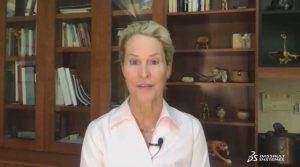
Dr. Arnold describes herself as an engineer inspired by the chemistry of the biological world. “Nature has figured out how to transform a wide range of natural resources into living, adapting, moving, sometimes even thinking, organisms,” she began. But no one knew the rules for engineering such complex systems.
The problem to answer, Dr. Arnold described, is “How does a sequence of DNA encode the amino acid sequences that fold into a beautiful, three-dimensional structure and, most importantly, has a useful function for a human being and do it better than nature can?” She related that we may not know how to engineer proteins, but nature does! And we can use this process that has already been demonstrated to work.
“It was an engineering algorithm, a simple process of mutation and natural selection that has over multiple generations given rise to remarkable diversity . . . and all the remarkable functions in the biological world.” So, it’s as simple as applying the algorithm? Well, think of the possibilities.
Nature has been evolving over 4 billion years, but the natural mechanics for generating diversity are limited; but not so in a test tube. What if you free nature from supporting the constructs of current life and explore what’s physically possible? Could there lie the answer to the energy crisis? Cancer? How do you discover them? How can we access chemistry that is entirely new to the biological world?
According to Dr. Arnold, the innovation is already there – we need to discover it in the vast collections of functions that nature has already made.
“With such a vast collection of capabilities, the innovation is there,” she says. “Nature’s been doing the Internet of Living Things . . . transferring information in forms of DNA and other forms of molecules, back and forth, crowd sourcing, problem solving and doing it very, very effectively, creating this incredible network using evolution.” She continues, “I hope that we can learn from this Internet of Living Things and learn how to live sustainably, like nature does, as part of this network.”
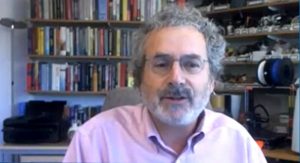
The last presenter for the session was Professor Neil Gershenfeld, Director of the Center for Bits and Atoms at the Massachusetts Institute of Technology (MIT). It’s a unique laboratory that breaks down boundaries between the digital and physical worlds.
Professor Gershenfeld took us on a dynamic, rapid, insightful excursion touching on the emerging, worldwide Fab Lab network; rapid prototyping; the emergence of coordinated, but distributed production in response to needs for the pandemic; and merging communication, computation and fabrication to shape a third digital revolution that’s more sustainable, inclusive and responsive as was demonstrated in the pandemic.
He posed the question – what are the minimum building blocks for a viable technological civilization? Based on what was observed and merging ideas driven by the pandemic, that civilization can be more locally sustainable and self-sufficient, less dependent on long supply chains. Although we experienced great loss and destruction in 2020 from the pandemic, that crisis acted as an amazing impetus that radically accelerated scientific innovation and experience
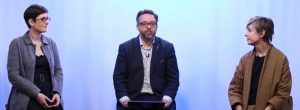
The round-up panel discussion with Claire Biot, Vice President, Life Sciences industry at Dassault Systèmes, and Alice Steenland, Chief Sustainability Officer, Dassault Systèmes, and Patrick noted how nature itself serves as a compass for innovation and sustainability, like a circular economy, nature has no waste. Innovation is non-linear, and we should be hopeful with what governments and corporations are doing. Science can help us shape tomorrow’s world and help drive this Industry Renaissance we are all part of in a sustainable, inclusive and responsive manner.
If you missed Episode 1: Powering A Better Future With Science, you can register now to get access and watch it. If you already registered for the episode, you can watch it again through your access link.
Watch for recaps coming up for
Episode 2: A New Era To Re-Define Sustainable Life – making possible more personalized patient therapies using virtual twins of humans
Episode 3: Science Takes Manufacturing To New Levels – on the new path to smarter, safer and more efficient production with a focus on circular economy and recycling
and REGISTER NOW for
Episode 4: Tomorrow’s Sustainable Cities, Tuesday, November 10, 2020 – making cities sustainable and citizen-focused in the face of growing challenges – environment, natural disasters, mobility, public health and safety.

